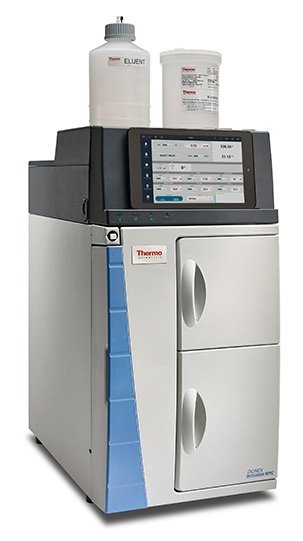Ion chromatograph Dionex integrion RFIC
DESCRIPTION
The versatile Dionex Integrion Monoblock Ion Chromatograph performs all types of analyzes using conductometric and amperometric detection. Ion chromatograph has a double-plunger pump, a portable liquid crystal plate with Russian language support, a reagent-free eluent generator, a self-regenerating background signal suppression system SRS, a thermostatted cell, a column thermostat, and a vacuum degasser, as well as a set of high-performance analytical columns for high-precision determination of anions, cations, acids, amines, sulfides, cyanides, amino acids, etc. It is full automation based on Chromeleon software that provides control, digital signal acquisition, and data processing on a PC using a high-speed USB interface.
The Dionex Integrion System is ideal for ultra-fast and ultra-efficient separations that were not possible with earlier models. In addition, unrivaled system flexibility provides the most comprehensive pressure range up to 5,000 psi and the ability to work with columns with a sorbent particle size of 4 microns.

USE IN THE PROJECT
Ion chromatograph (IC) is the basis of the glaciochemical task of the project. It allows measuring the ionic composition to determine various aspects of anthropogenic pollution (nitrogen, sulfur, halogens, for instance) in the past. The equipment also measures the concentration of sea-salt aerosols (sodium, chloride) and biogenic sulfur aerosols (methanesulfonate and sulfate) to investigate the past extent of sea ice. The purchase of a monoblock system Dionex Integrion is planned. We also plan to measure mono- and di-carboxylates, as we successfully did in the Caucasus ice core. The species are of interest for tracing back past vegetation emissions and biomass burning plumes. For certain species (halogens, methanesulfonate, carboxylates), very low concentrations are expected. Furthermore, for carboxylates, very stable retention times are required to obtain accurate data. From our knowledge and past experiences of some of us, we thus decided to buy the Dionex system, which appears to be, for many species of concern, the most reliable system and for which the additional cost compared to other systems is limited to a few million rub.
